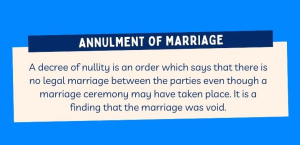Marriage Annulment in Australia – A Detailed Guide
Differences between divorce and marriage annulment, and what requirements you need to satisfy for the Court to issue a decree of nullity.
SYDNEY, NSW, AUSTRALIA, July 2, 2021 /EINPresswire.com/ -- What is an annulment of marriage?
An annulment of a marriage is a decree of nullity made by the Family Court under Part 3, Division 1, Section 23 of the Marriage Act 1961 (Cth) which voids the marriage; and is a legal procedure that declares a marriage null and void.
In simple terms, it means that the marriage was never valid and does not have the same legal implications that a divorce does. That is to say there is no risk of a a future property settlement dispute. In effect there is no shared property because you were not legally married.
How does an annulment differ from a divorce order?
A Divorce Order is a Court Order that dissolves a marriage whereas a a decree of nullity has the effect of stating that a marriage never existed between the two parties. In legal terminology a marriage annulment makes a void marriage which means it was not legally valid according to the law.
Under a Divorce Order, the assets of the marriage, including debts will be divided between the two parties. If children were created from the marriage then child custody and child support issues will be determined in a divorce proceeding.
The key difference between a Divorce Order and a Decree of Nullity is that under a Divorce Order the marriage was valid whereas under a Decree of Nullity, the marriage was was never actually valid.
What is a decree of nullity?
A decree of nullity is a retrospective Court Order stating that the two parties never had a legal marriage.
You can apply to the Family Court of Australia or the Family Court of Western Australia for an annulment. If your petition is successful then the declaration of nullity made by the Court is effective immediately and nullifies the marriage. An annulment does not however resolve child custody, child support or any property settlement disputes.
What are the grounds for annulment in Australia?
When a petitioner applies for an annulment, the Family Court of Australia will only declare a marriage invalid in limited circumstances such as:
-one of the parties was still legally married to another person at the time of the marriage, also known as bigamy
-the parties are in an illegal relationship, for example; one of the parties to the marriage is a close relative (grandparent, parent, child or sibling, or half sibling) which means that any marriage that took place is void ab initio, and was not legal at any point in time
-one of the parties could not give their full consent to the marriage because they were acting under duress or fraud
-one of the parties was misled as to the identity of the person, or the nature of the ceremony
-the celebrant was not authorised to perform a marriage ceremony
-mental incapacity
-one of the parties was under the influence of drugs or alcohol
-one of the parties was living with a mental illness or did not have the mental capacity to understand the effect of the marriage ceremony
-one of the parties was under the age that a person can legally get married at the time of marriage as laid out in Part 2, Section 12 of the Marriage Act 1961 (cth).
The Court will not however consider the following, as being sufficient grounds for annulment:
-non-consummation of the marriage
-not living together
-family violence
-incompatibility situations
If any of these apply, then you will need to petition for a Divorce Order.
Who can apply for an annulment of marriage?
A void marriage can automatically be annulled because it is based on an illegal act. Legal reasons for a voidable marriage may exist however the marriage will not be invalidated unless one of the spouses applies for an annulment.
To apply for an a decree of nullity of marriage for a voidable marriage you must:
-be an Australian citizen
-consider Australia to be your permanent home or ordinarily live in Australia or
-have done so for at least 12 months before you make the application.
If these circumstances do not apply to you then you will need to be separated for 12 months and apply for a Divorce Order if you wish to end the marriage.
If you meet the above criteria and can satisfy the grounds for annulment according to the Marriage Act (1961) Cth, you can petition to void the marriage. You cannot however apply for an annulment if one of the parties is deceased. You will need to petition for a Divorce Order instead.
How do I get a marriage annulled in Australia?
To get a marriage annulled in Australia you need to apply using an Initiating Application form. You will need to file three copies of the form along with a copy of the marriage certificate, plus an affidavit that contains information of the marriage ceremony and the grounds for annulment. You will be required to pay a Court filing fee. If you are experiencing financial hardship then you may be eligible for a concessionary rate.
You can either serve the annulment papers on the respondent or have them delivered by someone who can sign an Affidavit of Service. If the respondent does not accept the papers then the person delivering the papers can leave them on the floor in front of the respondent. The papers can also be served on the respondent’s legal representative, or through electronic methods or regular post if the respondent is willing to acknowledge the service of papers.
Unified Lawyers has been rated top three best family law firm in Sydney for the last five years now and boasts over 250 five star reviews online from happy clients.
For a confidential discussion and a free consultation with an experienced family lawyer, please do not hesitate to call our family law team on 1300 667 461.
Taylor Reardon
Unified Lawyers
+61 415 741 444
email us here
Visit us on social media:
Facebook
Twitter
LinkedIn
Legal Disclaimer:
EIN Presswire provides this news content "as is" without warranty of any kind. We do not accept any responsibility or liability for the accuracy, content, images, videos, licenses, completeness, legality, or reliability of the information contained in this article. If you have any complaints or copyright issues related to this article, kindly contact the author above.


